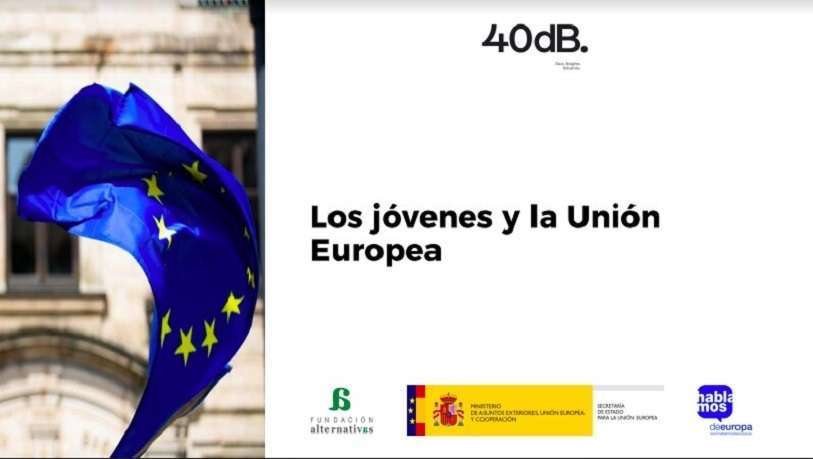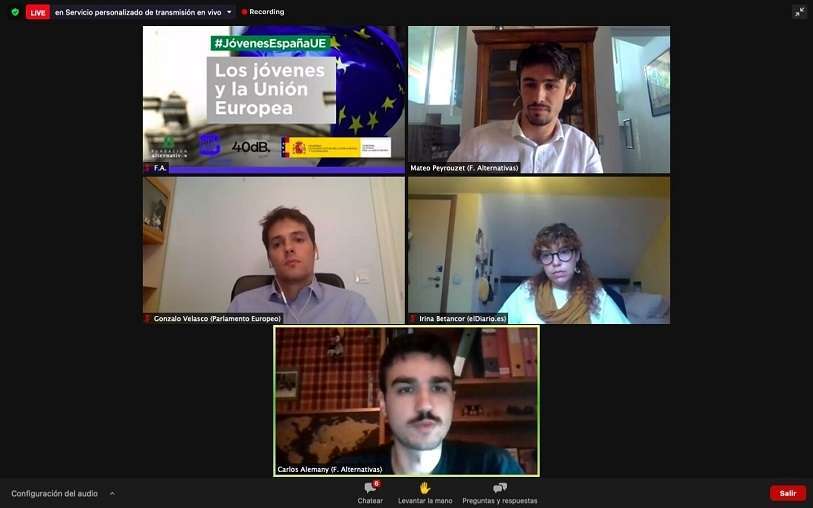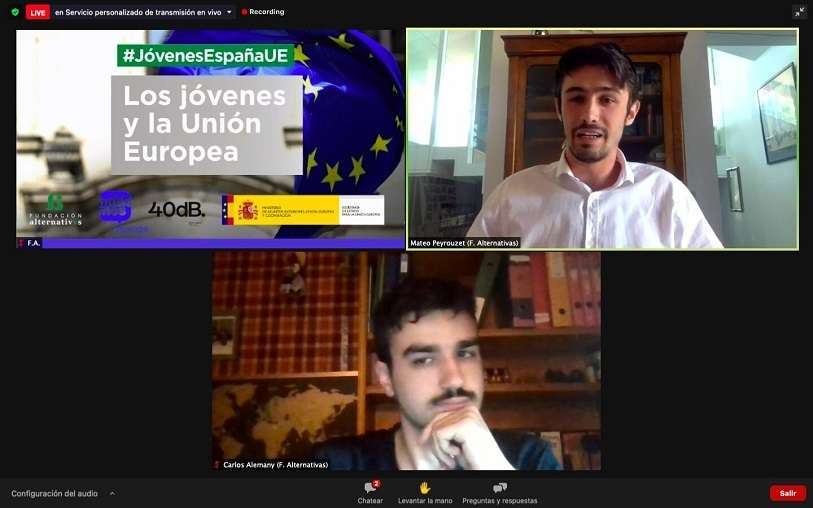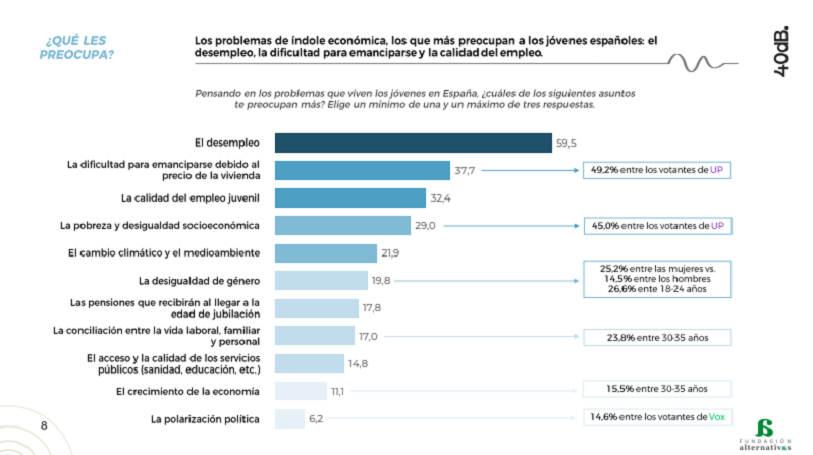Spanish youth is pro-European

What does the European Union mean to young people? The new generations seem to maintain a certain distance from what happens in the corridors of Brussels, and the collective imagination still projects the figures of the so-called 'men in black', those guys in suits who forced member states to buckle down during the 2008 crisis. Today, more than a decade later, Europe is trying to coordinate another response to a new crisis capable of bringing together, this time, the feelings of a new batch of young people.
In this context of economic recovery, the Alternativas Foundation presented this Thursday the survey 'Young people and the European Union', a study carried out in June by the research agency 40dB with one main objective: to assess the state of opinion about the European Union among citizens between 18 and 35 years of age.
The event, directed by the coordinator of the Foreign Policy Observatory of the Alternativas Foundation, Mateo Peyrouzet, was attended by young analysts with great projection. The panel was made up of Carlos Alemany, also a member of the Foundation; Gonzalo Velasco, public opinion analyst in the European Parliament; and Irina Betancor, political analyst and contributor to elDiario.es.

Alemany summarised the most relevant points of the survey, mainly related to the existence of a European identity, the role of youth within the political community and the action taken by the EU itself in the COVID-19 crisis, as well as the future of the organisation.
For the political scientist Gonzalo Velasco, it is "convenient" that this type of analysis focused on youth is carried out, and that "we should not only be criminalised because of COVID-19 and we do not only have to pay the pensions of the baby-boom generation, but we have to live. We are the future, but we are also the present of Spain and the European Union.

First of all, one of the most significant data that the study reveals is the great affection for the European Union among Spanish youth. Two out of every three young people feel pro-European, and up to 38.3% have between eight and 10 per cent affinity with the organisation. Along these lines, more than half believe that the degree of integration in the EU has remained the same during the pandemic, and 17% believe that it has increased.
For Peyrouzet, this sense of belonging to Europe is due to the need for many young people to emigrate to other EU countries and, above all, to the Erasmus effect. According to Betancor, the new members of Spanish society are prepared "to feel more European than national" after living more and more life experiences across the continent.

On the other hand, young people are also aware of the EU's major shortcomings. Concern about the socio-economic situation among the younger generations is palpable and a general trend that tends to be repeated across the continent, especially in southern European countries. The podium of concerns is made up of unemployment, the difficulty of emancipation and the quality of youth employment.
The list also includes serious concerns about socio-economic inequality, climate change, gender equality, pensions and access to and quality of public services, work-life balance and, ultimately, economic growth and political polarisation.
In this regard, Velasco said that in Spain "we have a harsh reality, we have economic and employment problems. But the positive point is that we are linked to the European Union". Peyrouzet agreed with the precariousness and the degree of ties to the EU, although he considers that his generation "was born into a fairly privileged material context".

The other side of the coin, that is, the main advantages of being part of the European Union for young people have to do with the ability to travel "freely" without the need for visas and the academic and work opportunities in other countries in the area - in the latter case without the need to obtain a work permit. For Betancor, young people see this freedom of movement "as an economic opportunity". "The EU is the working and academic future to which many young people aspire", he remarked.
The ability to access a common market and currency and to live in an area "where democracy and the rule of law are respected and enforced" are other favourable aspects for young people. This last point was highlighted on Thursday when the EU opened a case against Hungary and Poland for violating LGTBI rights.

The austerity measures deployed from Brussels in the aftermath of the 2008 financial crisis stretched the noose between some member states and the rest of the EU to the breaking point. The ravages fuelled anti-European sentiment and provoked the emergence of new populist political formations, so the organisation's strategy to respond to this new post-COVID scenario is diametrically opposed.
The Next Generation recovery funds, approved a year ago to the tune of 750 billion euros, are intended to serve as a new Marshall Plan for economic transformation in the wake of the pandemic. The perception of Spanish youth, however, does not seem to correspond to the actions undertaken by the EU. For them, especially UN Podemos voters, the European community has protected big business rather than the elderly or the most vulnerable. The same criticism has been repeated since the previous crisis.
Most young Spaniards are unaware of the existence of this lifeline, so they are also unaware of the Recovery, Transformation and Resilience Plan promoted in this case by the Spanish government. According to the study, 49.6% have not even heard of them. However, more than half of those who are aware of the plan are optimistic that it will indeed do the job.

Public opinion analyst at the European Parliament, Carlos Velasco, has revealed that one of the points of debate within the European Union continues to be that of broadening the avenues for democratisation. The constant finger-pointing at bureaucracy and immobility has for years dogged the perception of the community, which is now trying to regenerate itself.
"We have to move towards transnational parties," said Velasco. "I think it is very difficult for us to go there, but it is a clear demand. The speakers highlighted the role of DiEM25, the European political formation led by the former Greek finance minister and a great critic of the EU, Yanis Varoufakis, who ran unsuccessfully in the last elections in several EU states.

In short, Europe is entering a new episode that promises to be decisive for the organisation's long-term aspirations. The future lies in combating emerging Euroscepticism and weaving a link towards possible federalisation. The EU will need to win the support of young people.







